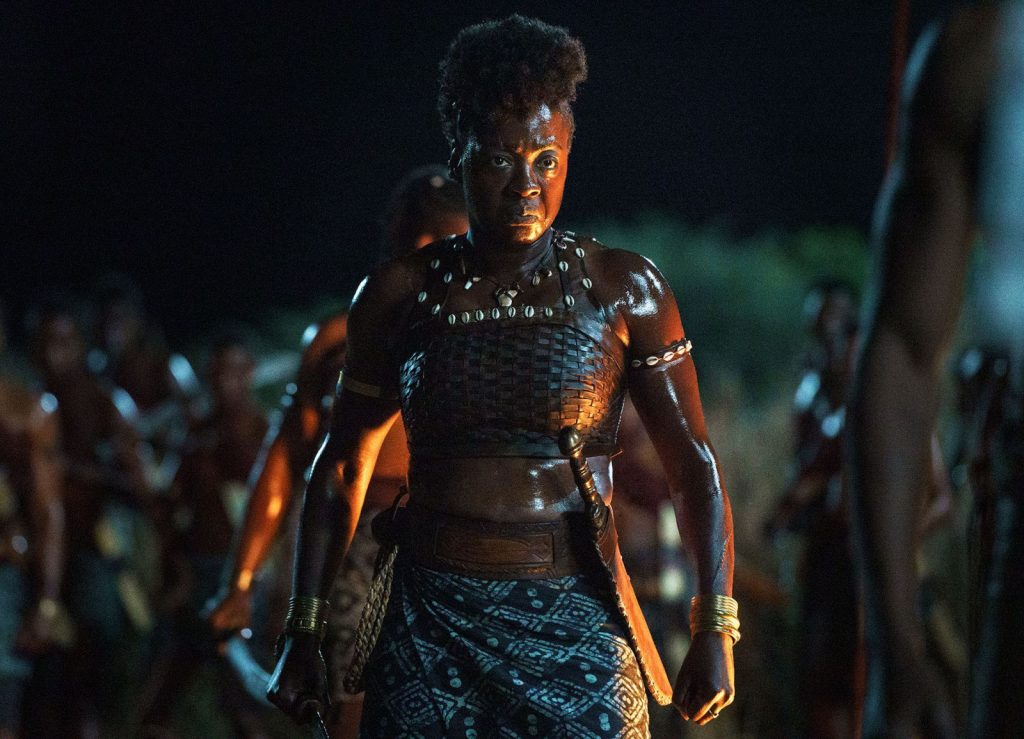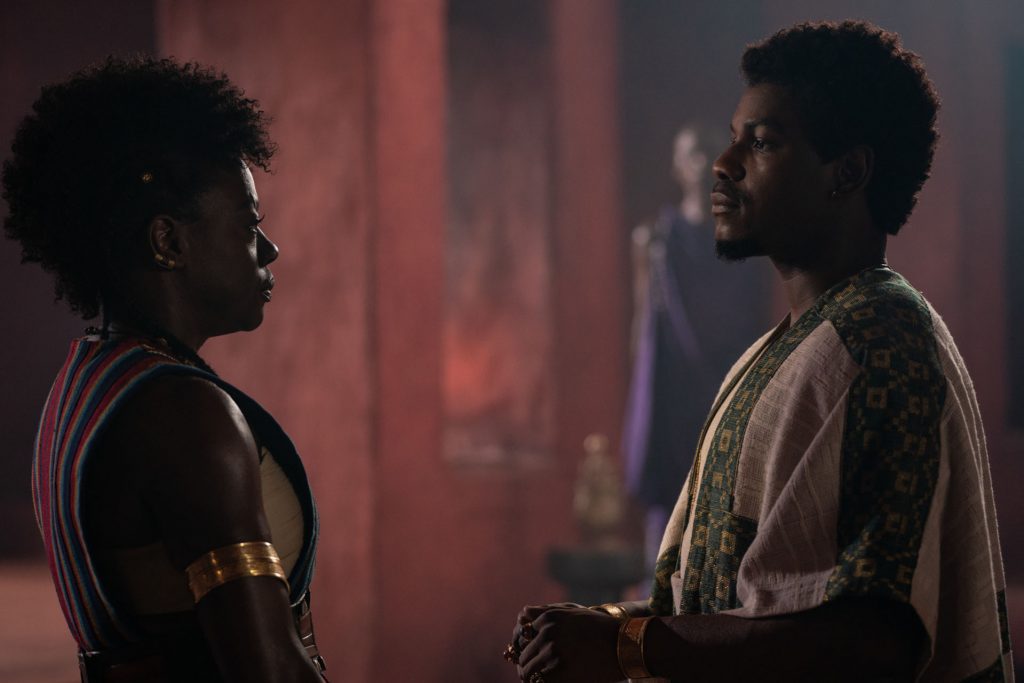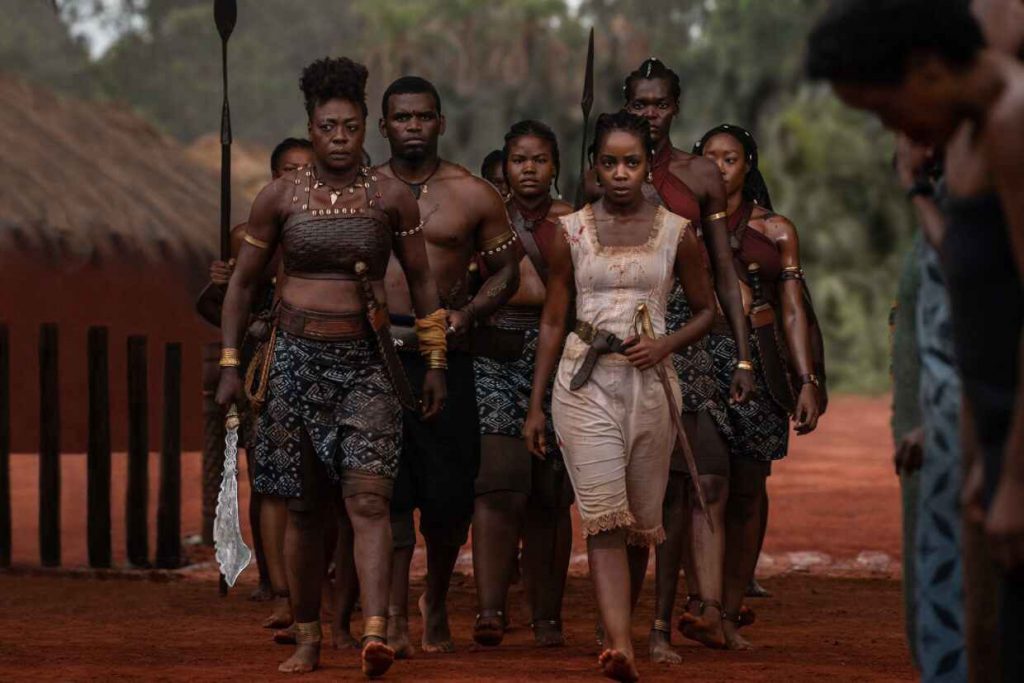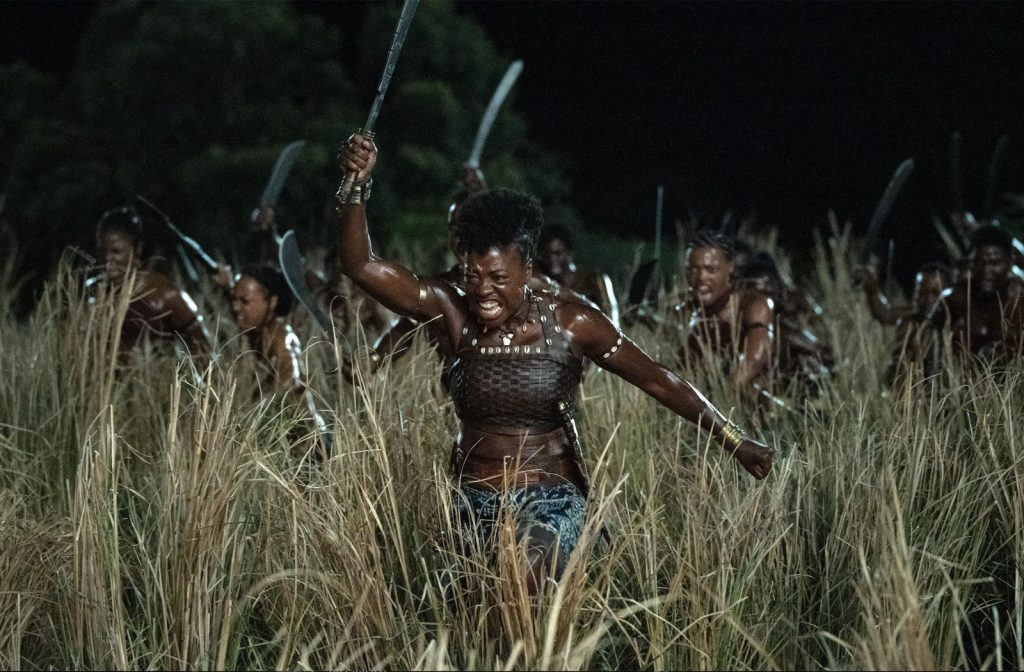The race to the box office has begun for South African movie lovers ahead of the release of the highly anticipated Sony Pictures movie The Woman King, which launches today.
It is directed by American screenwriter and director Gina Prince-Bythewood, known for films such as Love & Basketball, Disappearing Acts and The Secret Life of Bees.
It is based on the story of the tactical, skilful and fierce Agojie, an all-female military unit responsible for protecting the Dahomey Kingdom in West Africa (in what is now Benin) during the 1800s. It follows the journey of General Nanisca, played by Oscar award-winner Viola Davis.
Lashana Lynch plays the role of Izogie, “a strong leader and fighter”. Lynch is best known for making history last year as the first black female 007 in the James Bond movie No Time to Die. South African actress Thuso Mbedu plays Nawi, “a rebellious and eager recruit, ready to prove her worth”.

The Mail & Guardian’s Friday editor spoke to Prince-Bythewood about the all-female lead film.
When you went to meet Viola Davis to talk about directing the film, you ended up crying and left wondering if you’d messed it up. How do you deal with vulnerability in relation to being strong?
One of the things I feel like I’ve learned most in this process, and during this film, is that vulnerability can be a strength. It has been seen as a weakness.
Being a female director, you don’t show vulnerability, yet I knew going into this that I wanted to show the humanity of these women, I wanted to show their absolute strength. But I also wanted to show their vulnerability and that their vulnerability was a strength as well.
Having that meeting, that in the moment horrified me. But Viola says that that was a moment where she knew she could be directed by me, because I had shown she felt like she could trust me.
That really blew me away and started to change my mindset.
The actors talked about that as well; that they wouldn’t trust somebody, a director, who could not be in touch with their vulnerability. So, it certainly opened me up.
Of course, I’m not going to cry all the time. But, in this film, so much of the time we were dealing with really deep stuff and to be able to sit with an actor, and stay in the emotions of what they were going through, made me a better director.

The Woman King was filmed in South Africa when the Omicron variant of Covid-19 happened and you ended up spending Christmas here with the actors. What was that like for you, spending Christmas away from home and in a country where there’s no snow?
I love the heat. So, the fact that I got to have a year of summer — I had summer in LA and then I left and, when I got to South Africa, what would have been my winter is your summer — I was in heaven.
My family actually came to be with me during the holidays, because we got shut down because of Omnicron.
Something psychological in my head said if I left, we would not be coming back, and so I felt like I needed to stay there. Viola stayed there as well. So, my family came. And it was really good.
Because my husband and I had been to South Africa for our honeymoon (we also went to Ghana and Kenya) we always said we wanted to bring our boys back to be on the continent. So it was exciting to be able to bring them to South Africa, to spend those two weeks together and travel around to just experience it.
You first met Viola when there was a screening party for The Secret Life of Bees. She said that she thought you didn’t like her. Can you tell us about that interaction?
I’m shy, so I’m not good at starting conversations. If I know you, then you can’t shut me up. But it was Viola Davis and she was sitting right across from me. I had great excitement about that but was also scared to death.
I didn’t know how to talk with her, since she’s an introvert as well. It’s like a shy person and an introvert trying to have a conversation — that’s just deadly.
I kind of felt the same way — that she wasn’t feeling me — and Viola thought I wasn’t feeling her, as opposed to I was just so blown away and kicking myself under the table.
I kept thinking: “Would you talk to her? You revere her work; you want to work with her.” And I just couldn’t. I couldn’t break through my own brain. So, it just wasn’t meant to be in that moment but I’m grateful that we have this experience because now we are mad cool.
You brought on Terence Blanchard, with whom you worked on Love & Basketball, to do the score for the film. Tell us about your relationship with him …
With the score I knew from the outset, as soon as I got the script, that
 Viola Davis and John Boyega star in THE WOMAN KING.
Viola Davis and John Boyega star in THE WOMAN KING.
I was going to go to Terence for the score since we’ve worked together before. He’s brilliant and his work has always been brilliant.
I also knew I wanted a collaboration between Terence and South African artists, and Lebo M of course, who most famously worked on The Lion King.
We met with him and his passion to be a part of this was infectious. Lebo was in charge of the songs that are within this in terms of the dance sequences, the tributes that they gave to the king and to each other.
Terrence did the score and, going in, we wanted it to feel unlike anything that we’ve seen before.
We talked about wanting it to have a classic feel, but cultural. It was building an orchestral score of African instrumentation and then layering on top of that choir and voice and Dianne Reeves was the voice that we used.
It was really just wanting to evoke ancestors and a connection to the past and Dianne has so much beautiful gravitas and soul it was just a really beautiful combination. I’m proud of the work that Terence did.
Lashana Lynch’s character, Izogie, provides humour at difficult times in the film. That type of dry humour is something unique to Africans. How did you know those nuances about African people?
Lashana — I can’t say enough about her. Izogie was cool on the page but, once I cast Lashana … I knew when
I read the script … I wanted Lashana for this part. There was nobody else, it was going to be Lashana.
Then she and I got to work on building that character. She inspires you to want to write more for her because she’s so good.
We talked about Izogie being a bad-ass nun; that was Lashana’s take on her. She didn’t want friendships, she didn’t want connections, all she was focused on was being great and that she was hardcore … she’s hardcore because of her trauma.
We just started coming up with things that she’s saying; it was funny to us but we didn’t know if it would translate. Lashana created such an incredible backstory for Izogie. The film was lucky to have Lashana. She was such a gift.
Did Thuso Mbedu teach you any Zulu words? And what was she like in this, her first big action role?
Thuso is amazing. She is a generational talent in terms of her chops but her work ethic is insane. It’s what’s going to sustain her in this industry. She wants to be great. She is like Viola in that respect. They both want greatness. But you can’t just want it, you have to work for it and Thuso is willing to put in the work.
She also has that innate vulnerability that makes an audience care about her. She’s fantastic and she’s so smart with characters and so smart with story. She made her character better.
You just believe her, you believe in every single aspect and, yes, she taught me a couple of words. Of course, I’m blanking but “yebo” is one which I use nonstop. She taught me five words, which I used all the time out there, like yebo, but now I’ve forgotten everything else. I need to go back and get a refresher!
You have an aversion to sequels, but I know you’re doing The Old Guard again, as a producer not a director this time. Would you do a sequel for The Woman King or would you say it’s too soon?

Let’s see how the film does. But this was the story I wanted to tell. This was a full story. What I want is that this film and its success inspire more stories, because there’s a thousand more stories that we can tell. So that’s what I want for this.
The Woman King opens in South Africa today.
The race to the box office for South African movie lovers has begun ahead of the release of the highly anticipated Sony Pictures movie The Woman King expected to be launched on September 30 2022. Directed by American screenwriter and director Gina Maria Prince-Bythewood known for directing films like Love & Basketball, Disappearing Acts, The Secret Life of Bees and now the movie The Woman King.
Based on the Agojie, an all female military unit who were responsible for protecting the Dahomey Kingdom in West Africa (now Benin) during the 1800s that were tactical, skillful and fierce. The film follows the journey of General Nanisca, played by Oscar award winning actress Viola Davis.
Thirty four year old Lashana Lynch plays the role of Izogie “a strong leader and fighter”. Lynch best known for making history in 2021 as the first black female 007 in the James Bond movie No Time To Die. South African actress Thuso Mbedu plays Nawi, “a rebellious and eager recruit ready to prove her worth”.
The Mail & Guardian’s Friday editor spoke to American director Gina Prince-Bythewood about the all-female led film.
When you went to meet Viola Davis to talk about you directing the film, you ended up crying and you left wondering if you’d messed it up? How do you deal with vulnerability in relation to being strong?

One of the things I feel like I’ve learned most in this process and during this film, is that vulnerability can be a strength. It’s been seen as a weakness, being an athlete, being a female director, you don’t show vulnerability, yet, I knew going into this, that I wanted to show the humanity of these women, I wanted to show their absolute strength. But I also wanted to show their vulnerability and that their vulnerability was a strength as well. And having that meeting, that in the moment horrified me. But Viola says that that was a moment where she knew that she could be directed by me, because I had shown that she felt like she could trust me. That really blew me away and started to change my mindset. The actors talked about that as well; that they wouldn’t trust somebody, a director who could not be in touch with their vulnerability. So it certainly opened me up. Of course, I’m not going to cry all the time. But in this film, so much of the time, we were dealing with some really deep stuff and to be able to sit with an actor, and stay in the emotions of what they were going through made me a better director.
The Woman King was filmed in South Africa when the Omicron variant of covid-19 happened and you ended up spending Christmas here with the actors. What was that like for you, spending Christmas away from home and in a country where there’s no snow?
I love the heat. So the fact that I got to have a year of summer (I had summer in LA, and then I left and when I got to South Africa, what would have been my winter is your summer), I was in heaven. My family actually came to be with me during the holidays, because we got shut down because of Omnicron. Something psychological in my head said that if I left, we would not be coming back and so I felt like I needed to stay there. And Viola stayed there as well. So my family came. And it was really good. Because my husband and I had been to South Africa for our honeymoon (we also went to Ghana, Kenya and South Africa) we always said we wanted to bring our boys back to be on the continent. And so it was exciting to be able to bring them to South Africa to spend those two weeks together and travel around to just experience it.
You first met Viola when there was a screening party for the Secret Life of Bees. And she said that she thought you didn’t like her. Can you tell us about that interaction?
I’m shy so I’m not good at starting conversations. If I know you, then you can’t shut me up. But it was Viola Davis and she was sitting right across from me. I had great excitement about that but was also scared to death. I didn’t know how to talk with her since she’s an introvert as well. So it’s like a shy person and an introvert trying to have a conversation that’s just deadly. I kind of felt the same way that she wasn’t feeling me and Viola thought I wasn’t feeling her, as opposed to I was just so blown away and kicking myself under the table. I kept thinking: “Would you talk to her? You revere her work, you want to work with her.” And I just couldn’t. I couldn’t break through my own brain. So it just wasn’t meant to be in that moment but I’m grateful that we have this experience because now we are mad cool.
You brought on Terence Blanchard, whom you worked with on Love & Basketball, to do the score for the filmg. Tell us about your relationship with him?
With the score I knew from the outset, as soon as I got the script, that I was gonna go to Terence for the score since we’ve worked together before. He’s brilliant, and his work has always been brilliant. I also knew I wanted a collaboration between Terence and South African artists, and Lebo M of course, who most famously worked on The Lion King. We met with him and his passion to be a part of this was infectious. And so Lebo was in charge of the songs that are within this in terms of the dance sequences, the tributes that they gave to the king and to each other. Terrence did the score and going in, we wanted it to feel unlike anything that we’ve seen before. We talked about wanting it to have a classic feel but cultural, it was building an orchestral score of African instrumentation and then layering on top of that choir and voice and Dianne Reeves was the voice that we used. It was really just wanting to evoke ancestors and a connection to the past and Diane has so much beautiful gravitas and soul it was just a really beautiful combination. I’m really proud of the work that Terence did.
Lashana Lynch’s character, Izogie, provides humour at sometimes difficult times in the film. That type of dry humour is something unique to Africans, how did you know those nuances about African people?

Lashana, I can’t say enough about her. Izogie was cool on the page but once I cast Lashana I knew when I read the script that I wanted Lashana for this part. There was nobody else, it was going to be Lashana. Then she and I got to work in building that character. And she inspires you to want to write more for her because she’s so good. We talked about Izogie being a badass nun, that was Lashana’s take on her. She didn’t want friendships, she didn’t want connections, all she was focused on was being great and that she was hardcore. But through that and in her trauma, she’s hardcore because of her trauma. But we just started coming up with things that she’s saying, it was funny to us but we didn’t know if it would translate. Lashana created such an incredible backstory for Izogie. The film was lucky to have Lashana. She was such a gift.
Did Thuso Mbedu teach you any Zulu words? And what was she like in this, her first big action roll?
Thuso is Amazing. She is a generational talent in terms of her chops, but her work ethic is insane. And it’s what’s going to sustain her in this industry. She wants to be great. She is like Viola in that respect. They both want greatness. But you can’t just want it, you have to work for it and Thuso is willing to put in the work. She also has that innate vulnerability that makes an audience care about her. She’s fantastic and she’s so smart with characters and so smart with story. She made her character better. And you just believe her, you believe in every single aspect and, and yes, she taught me a couple of words. And of course I’m blanking but Yebo was one which I use nonstop. She taught me five words which I used all the time out there, like Yebo, but now I’ve forgotten everything else. But I need to go back and get a refresher.
You have an aversion to sequels, and I know you’re doing “The Old Guard” again but not directing it, but as a producer this time. So would you do a sequel for The Woman King, or would you say it’s too soon?
So let’s see how the film does. But this was the story I wanted to tell. This was a full story. But what I want is that this film and its success inspires more stories, because there’s a thousand more stories that we can tell. So that’s what I want for this.
The Woman King opened in South Africa on 30 September.